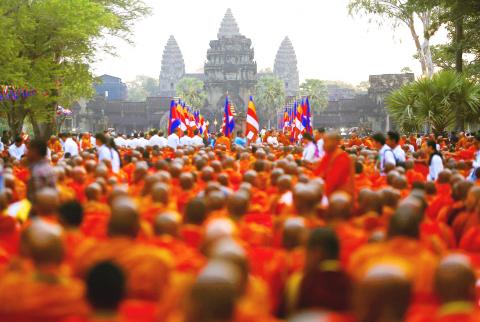Thousands of orange-clad monks yesterday joined Cambodian Prime Minister Hun Sen for a prayer ceremony by the famed Angkor temple, lauding “political stability” after the main opposition party was dissolved, an act that has cemented the strongman’s grip on power.
Hun Sen has ruled Cambodia since 1985, making him one of the world’s longest-serving leaders, an accolade earned through a mix of cold political strategy, deft public relations and repression.
His rule appears virtually assured after a court early last month disbanded the main opposition party ahead of next year’s elections.

Photo: Reuters
As dawn rose over the tiered stone domes of Angkor Wat, Hun Sen joined prayers with 5,000 Buddhist monks, in a ceremony touted as celebrating peace and stability at the symbolic heart of Khmer power.
Graceful apsara dancers, fingers curled in the traditional art, went through their moves as thousands gathered for the event at the vast Angkor complex — the centerpiece of the Khmer empire, which draws back to the ninth century.
Hun Sen, who has cast himself as a figure of stability in a country ravaged by the genocidal Khmer Rouge regime, was front and center of a morning of careful choreography.
Kneeling, hands clasped in prayer, he received blessings from monks who sang Buddhist mantras and scattered flower petals.
“We live with peace under the prime minister’s rule,” Prum Seab, 49, who was among the crowd, told reporters. “I am happy.”
Cambodian Minister of Tourism Thong Khon warmed to the theme.
“We hold this ceremony for continuous prosperity ... we pray for continued peace and stability,” he told reporters, swatting away the question of a political crisis in the country.
“We have no crisis, but there are politicians who are having a crisis themselves,” he said.
Analysts had predicted a strong challenge to Hun Sen at next year’s election, after the youth vote in 2013 took the opposition Cambodia National Rescue Party (CNRP) to its best-ever electoral result.
However, Hun Sen has rallied in the intervening years, boosting his public profile through Facebook, while systematically using the kingdom’s pliant courts to hack away at the CNRP, as well as critics in civil society and the media.
Cambodia’s main opposition party was finally dissolved last month over accusations it conspired with the US in a treason plot.
The case was criticized by Washington as baseless, while rights groups said it has hastened the country’s descent into a de facto one-party state.
Hun Sen has turned up the anti-US rhetoric to justify the unprecedented crackdown, which has included shuttering critical media outlets with trumped-up tax charges or arresting journalists on allegations of spying.
In step, he has deepened Cambodia’s embrace of regional heavyweight China, whose low-interest loans and infrastructure schemes are driving a boom in one of Southeast Asia’s poorest countries.

POLITICAL PRISONERS VS DEPORTEES: Venezuela’s prosecutor’s office slammed the call by El Salvador’s leader, accusing him of crimes against humanity Salvadoran President Nayib Bukele on Sunday proposed carrying out a prisoner swap with Venezuela, suggesting he would exchange Venezuelan deportees from the US his government has kept imprisoned for what he called “political prisoners” in Venezuela. In a post on X, directed at Venezuelan President Nicolas Maduro, Bukele listed off a number of family members of high-level opposition figures in Venezuela, journalists and activists detained during the South American government’s electoral crackdown last year. “The only reason they are imprisoned is for having opposed you and your electoral fraud,” he wrote to Maduro. “However, I want to propose a humanitarian agreement that

ECONOMIC WORRIES: The ruling PAP faces voters amid concerns that the city-state faces the possibility of a recession and job losses amid Washington’s tariffs Singapore yesterday finalized contestants for its general election on Saturday next week, with the ruling People’s Action Party (PAP) fielding 32 new candidates in the biggest refresh of the party that has ruled the city-state since independence in 1965. The move follows a pledge by Singaporean Prime Minister Lawrence Wong (黃循財), who took office last year and assumed the PAP leadership, to “bring in new blood, new ideas and new energy” to steer the country of 6 million people. His latest shake-up beats that of predecessors Lee Hsien Loong (李顯龍) and Goh Chok Tong (吳作棟), who replaced 24 and 11 politicians respectively

Young women standing idly around a park in Tokyo’s west suggest that a giant statue of Godzilla is not the only attraction for a record number of foreign tourists. Their faces lit by the cold glow of their phones, the women lining Okubo Park are evidence that sex tourism has developed as a dark flipside to the bustling Kabukicho nightlife district. Increasing numbers of foreign men are flocking to the area after seeing videos on social media. One of the women said that the area near Kabukicho, where Godzilla rumbles and belches smoke atop a cinema, has become a “real

‘WATER WARFARE’: A Pakistani official called India’s suspension of a 65-year-old treaty on the sharing of waters from the Indus River ‘a cowardly, illegal move’ Pakistan yesterday canceled visas for Indian nationals, closed its airspace for all Indian-owned or operated airlines, and suspended all trade with India, including to and from any third country. The retaliatory measures follow India’s decision to suspend visas for Pakistani nationals in the aftermath of a deadly attack by shooters in Kashmir that killed 26 people, mostly tourists. The rare attack on civilians shocked and outraged India and prompted calls for action against their country’s archenemy, Pakistan. New Delhi did not publicly produce evidence connecting the attack to its neighbor, but said it had “cross-border” links to Pakistan. Pakistan denied any connection to